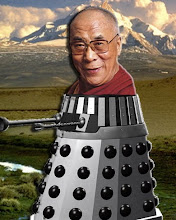Looking for a fun but educational diversion on the intertubes during your holiday downtime? Try:
http://www.youtube.com/profile?user=CaptainDisillusion&view=videos
Captain Disillusion does a fantastic job of making critical thinking look cool (which it is by the way) and he's very funny in doing so. His videos also have the highest production values I've ever seen on YouTube. Penguin Slap Debunk is a great place to start.
Wednesday, December 24, 2008
Sunday, December 21, 2008
Why Only Christmas?
I recently did a holiday quiz for the Skeptic group I belong to. While researching myths associated with this time of year, I came across an interesting curiosity. It seems that while the Christian holidays have a pages dedicated to seasonal myths, the Jewish and Muslim faiths have, as far as I can tell, none.
Why? Is it because their belief system is so rigid that it doesn't allow for any questioning of the doctrine? Could it be that most Christians are more open-minded and accept adding on non-theist, or more accurately, Pagan traditions to their celebrations? I would bet that if you took a worldwide survey on people's first impressions of Christmas and Easter, Santa (or Father Christmas in his various incarnations) and the Easter Bunny (or Easter Bell in Italy), would be the first thing most people associate with the holidays, and not the birth and resurrection of Jesus.
But that brings up the question; What is a myth? According to the dictionary it's:
"A traditional, typically ancient story dealing with supernatural beings, ancestors, or heroes that serves as a fundamental type in the worldview of a people, as by explaining aspects of the natural world or delineating the psychology, customs, or ideals of society."
With this definition, isn't all religion mythology? Every religion practiced today would fall under this definition. Why is the Jewish Torah anymore believable than the secret texts of Scientology? The one thing they all have in common is that they can not be proven to be true. There is no factual evidence on which these beliefs are based, many actually contradict historical documents.
It all comes down to "Faith" and that is a topic for another day!
Why? Is it because their belief system is so rigid that it doesn't allow for any questioning of the doctrine? Could it be that most Christians are more open-minded and accept adding on non-theist, or more accurately, Pagan traditions to their celebrations? I would bet that if you took a worldwide survey on people's first impressions of Christmas and Easter, Santa (or Father Christmas in his various incarnations) and the Easter Bunny (or Easter Bell in Italy), would be the first thing most people associate with the holidays, and not the birth and resurrection of Jesus.
But that brings up the question; What is a myth? According to the dictionary it's:
"A traditional, typically ancient story dealing with supernatural beings, ancestors, or heroes that serves as a fundamental type in the worldview of a people, as by explaining aspects of the natural world or delineating the psychology, customs, or ideals of society."
With this definition, isn't all religion mythology? Every religion practiced today would fall under this definition. Why is the Jewish Torah anymore believable than the secret texts of Scientology? The one thing they all have in common is that they can not be proven to be true. There is no factual evidence on which these beliefs are based, many actually contradict historical documents.
It all comes down to "Faith" and that is a topic for another day!
Labels:
Christmas,
critical thinking,
faith,
holidays,
religion
Subscribe to:
Comments (Atom)



